Thank you to Brandon Roman and the team at Squire Patton Boggs (US) LLP for this report.
June 25, 2021
The White House and twenty-one bipartisan Senators agree on a $1.2 trillion hard infrastructure framework. President Biden insists a bipartisan bill must move in tandem with a reconciliation package advancing his remaining priorities, stating he will not sign one without the other.
What We’re Hearing
- According to a chief-of-staff for a Senate Republican, the bipartisan infrastructure-working group plans to create subgroups that will focus on specific proposal elements.
What the White House Is Saying
- President Biden supports bipartisan infrastructure framework; calls on Congress to pass a budget resolution. On June 24, the White House released a fact sheet overviewing the $1.2 trillion infrastructure framework it agreed on with bipartisan Senators. It notes the bipartisan framework invests two-thirds of the resources proposed in the American Jobs Plan and the American Families Plan and calls on Congress to pass a budget resolution to pursue the remaining proposals in a reconciliation bill.
- Will not sign bipartisan bill without reconciliation bill. On June 24, after endorsing the bipartisan infrastructure deal, President Biden stated the bipartisan bill must move parallel with a reconciliation package advancing the rest of his economic agenda and that he will not sign one without the other. He expects Congress will vote on both pieces of legislation by September 30, the end of the fiscal year.
- Legislative priorities for reconciliation package. On June 23, President Biden, Office of Management Budget Acting Director Shalanda Young, National Economic Council (NEC) Director Brian Deese, and Domestic Policy Council Director Susan Rice met with Speaker Pelosi and Majority Leader Schumer to discuss the two-track approach for advancing the President’s economic agenda. The White House stated the reconciliation package should invest into the care economy and extend the child tax credit.
- Discussing infrastructure offsets with Democratic Members. On June 24, Treasury Secretary Janet Yellen and NEC Director Brian Deese met with Democratic leaders on Capitol Hill, including House Ways and Means Chair Richard Neal (D-MA) and Senate Finance Chair Ron Wyden (D-OR), to discuss the pay-fors included in the bipartisan infrastructure deal.
What Members Are Saying
- Bipartisan senators strike deal with White House on infrastructure framework. A group of twenty-one bipartisan Senators – ten Democrats and eleven Republicans – reached a deal with the White House on a $1.2 trillion infrastructure framework. The agreement includes $579 billion in new spending on roads and bridges, public transit, passenger rail, ports and airports, broadband, water systems, the power sector, and climate resiliency. The plan also includes $20 billion for an infrastructure-financing bank. The framework proposes a series of various offsets to pay for the plan, including closing the tax gap, repurposing pandemic relief funds, public private partnerships, private activity bonds, and direct pay bonds.
- Democrats prepare $6 trillion reconciliation bill. Senate Budget Committee Chair Sanders (I-VT) is preparing a reconciliation package to include President Biden’s social infrastructure proposals, as well as measures on prescription drug pricing and lowering the Medicare eligibility age. House Budget Committee Chair Yarmuth (D-KY) supports the proposals. Both chambers are planning to vote on a budget resolution in July, before August recess. The budget resolution will include reconciliation instructions, which will allow the Senate to avoid a Republican filibuster.
- House will not act until Senate clears reconciliation. On June 24, Speaker Pelosi stated that the House would not pass a bipartisan infrastructure bill until the Senate passes a reconciliation bill.
- Moderates and progressives clash on size of reconciliation package. Moderate Democratic Members from both chambers have expressed concern over the size of a $6 trillion reconciliation package, while progressives are seeking to maximize its size.
- House surface transportation reauthorization bill to receive floor vote next week. During the week of June 28, the House plans to vote on the INVEST in America Act, a five-year, $547 billion surface transportation reauthorization bill. Attached to the package is a series of water-related measures, including H.R. 1915, a $51 billion wastewater bill, and H.R. 3291, a $117 billion drinking water bill.
Key Dates
- Week of June 28. House Majority Leader Steny Hoyer (D-MD) plans to hold a vote on the INVEST in America Act the week of June 28.
- July 4. Speaker Pelosi is reportedly aiming to pass the package in the House before the July 4 Congressional recess.
- End of summer. The House and Senate surface transportation and reauthorization bills may go to conference by the end of summer.
- August 7. Tentative start date for Congressional August recess.
- September 30. FY21 government funding and other significant programs expire, including surface transportation authorization (FAST Act), National Flood Insurance Program, Transportation Security Administration, and Temporary Assistance for Needy Families.
Family Enterprise USA advocates for American Family business. We help family businesses communicate their challenges and contributions to American economic freedom to Legislators. We represent all American family businesses; not just specific industries and provide research to enhance the opportunity for success. We help family businesses continue to establish their unique business legacy. Family Enterprise USA is a 501(c)(3) non-profit organization.. Family foundations can donate.

